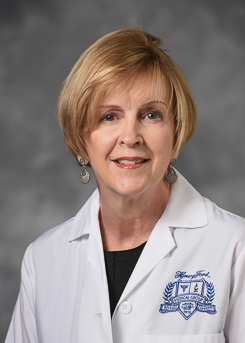|
Thousands of Patients. Zero Suicides. How Dr. Cathrine Frank Set An Audacious Goal for Henry Ford--And Met It
“Suicide is a major public health crisis. Someone kills his or herself every 14 minutes,” says Dr. Frank. “It is a tragedy like any death that could have been prevented.” For more than 18 years, Dr. Frank has helped lead an ambitious and much-lauded effort to reduce suicide in Henry Ford’s patient population to nearly zero, even as suicide rates in Michigan and across the United States have skyrocketed. “We know that depression as well as other syndromes can be comorbid with certain medical illnesses, but we also know that if mental health conditions are effectively treated, physical health and quality of life improve and healthcare costs decrease,” she says. In 2001, Dr. Frank and her colleagues in conjunction with C. Edward Coffey, M.D., then the chairman of the Department of Psychiatry, developed a program called “Perfect Depression Care,” with the aim of better addressing the mental health needs of patients across the health system. Instead of setting a safe goal to merely reduce the rate of suicides, Dr. Frank and her colleagues pushed for more: they aimed for no patient suicides at all. To some, this was radical. “In the automobile industry, or in the manufacturing industry, there is always a ‘zero defect’ rule. At the time, though, we were not thinking of healthcare in those same terms. The idea that suicide could be zero was a novel concept,” says Dr. Frank. Dr. Frank and her departmental partners persevered, developing and ultimately overseeing implementation of the Henry Ford zero suicide guidelines, which identify risk factors for suicide among the patient population. These guidelines required all mental health professionals to assess every patient during every visit for suicide risk and each patient’s risk was divided into high, moderate or low—but never “none.” “There is no such thing as no risk,” says Dr. Frank. “That was quite a novel idea at the time. The focus of our suicide guidelines is to modulate risk to decrease and eliminate risk and prevent suicide altogether.” Since its launch, the program has shown remarkable success: for a few years, there were—literally—zero patient suicides, and even in the years where it was not zero it was 80% lower than it was before the program began, and significantly lower than the state and national average. Zero suicide has now been adopted both nationally and internationally as a goal. Word has even spread to health advocates in other countries, some of whom have sought out Dr. Frank to learn more about the zero suicides initiative and its efficacy. “When England was coming up with their guidelines, they heard about what we had done. Their initial goal was to decrease suicide by 19%,” she says. “The idea that they would not aim for zero is striking in how people view this issue and indicative of the importance of this work.” Dr. Frank, along with her director of research, Brian Ahmedani, Ph.D., continue to study the impact of the guidelines, fine-tuning them as they gain new insights and educating the medical community on their benefits. The Department of Psychiatry is a part of a national consortium studying zero suicide and Dr. Ahmedani has been awarded a $4.8 million grant from the NIMH to study various models of suicide prevention. Dr. Frank is optimistic about the future of suicide prevention research, pointing to the thousands of lives the zero-suicide initiative has saved at Henry Ford—and beyond. In 2018, Dr. Frank and her husband, Dr. Stephen T. Smith, a physician in Henry Ford’s Department of Cardiology, furthered cemented their support for suicide prevention by establishing a planned gift for this research at Henry Ford, ensuring that this critical issue continues to receive the attention it deserves for a long time to come. “My husband and I have a passion to prevent and eliminate suicide,” says Dr. Frank. “We saw this gift as one way to contribute to those efforts not only at Henry Ford, but across the nation and worldwide as we learn from our research here. Zero suicide is now an international phenomenon.” |
|
|
 One suicide is too many in the eyes of Cathrine Frank, M.D.,
Chair of Henry Ford Health System’s Department of Psychiatry and Behavioral
Health Services.
One suicide is too many in the eyes of Cathrine Frank, M.D.,
Chair of Henry Ford Health System’s Department of Psychiatry and Behavioral
Health Services.